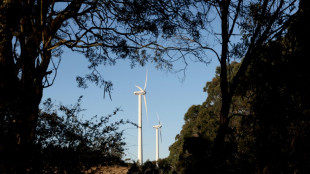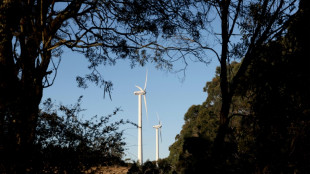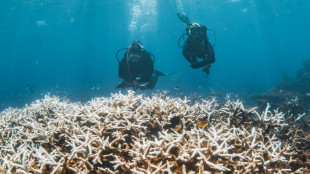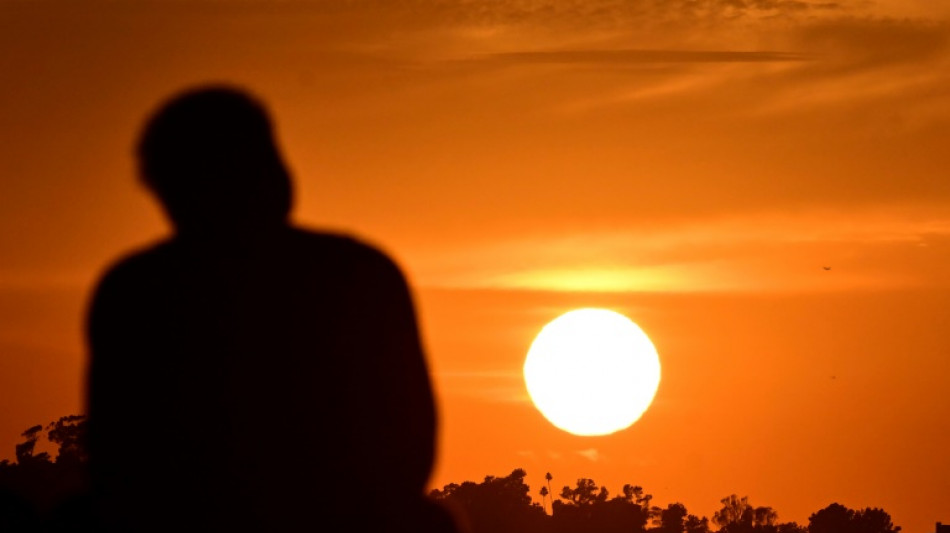
-
 Thunder sweep past Grizzlies into NBA playoffs 2nd round, Cavs on brink
Thunder sweep past Grizzlies into NBA playoffs 2nd round, Cavs on brink
-
South Korea's Ryu and Japan's Saigo share LPGA Chevron lead

-
 Canada leaders make closing pitches in campaign upended by Trump
Canada leaders make closing pitches in campaign upended by Trump
-
De Bruyne's Man City exit 'so difficult' for Guardiola

-
 'No regrets' for Amorim over Man Utd move
'No regrets' for Amorim over Man Utd move
-
Lyon and Strasbourg win to close in on Europe, Montpellier relegated from Ligue 1

-
 Toulouse thrash Castres as Top 14 pursuers stumble
Toulouse thrash Castres as Top 14 pursuers stumble
-
Djokovic crashes to nervous Arnaldi in Madrid opener, Swiatek advances

-
 Olympic champs Russell, Davis-Woodhall win at Drake Relays
Olympic champs Russell, Davis-Woodhall win at Drake Relays
-
Browns end Sanders long draft slide

-
 Cavs crush Heat, on brink of NBA playoff sweep
Cavs crush Heat, on brink of NBA playoff sweep
-
Fire rages after major blast at Iran port kills 8, injures hundreds

-
 Kiwi Beamish wins Penn Relays 1,500m crown with late kick
Kiwi Beamish wins Penn Relays 1,500m crown with late kick
-
Mbappe on Real Madrid bench for Clasico Copa del Rey final

-
 England survive France fightback to seal Women's 6 Nations slam
England survive France fightback to seal Women's 6 Nations slam
-
Palace sweep past Villa to reach FA Cup final

-
 CAF appoint Moroccan Lekjaa first vice-president
CAF appoint Moroccan Lekjaa first vice-president
-
Major blast at Iran port kills 5, injures hundreds

-
 Rodgers vows to stay with Celtic after fourth successive Scottish title
Rodgers vows to stay with Celtic after fourth successive Scottish title
-
Ipswich relegated as Newcastle, Chelsea boost top five bids

-
 Canada leaders make final pitches in campaign upended by Trump
Canada leaders make final pitches in campaign upended by Trump
-
Mullins -- Ireland's national training treasure

-
 US, Iran say progress in 'positive' nuclear talks
US, Iran say progress in 'positive' nuclear talks
-
Mullins emulates O'Brien with second successive trainer's title

-
 Ipswich relegated after one season in Premier League
Ipswich relegated after one season in Premier League
-
Just Stop Oil activist group holds final march
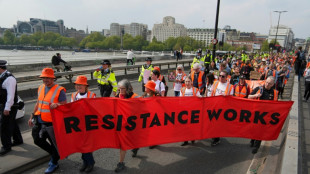
-
 Djokovic crashes to nervous Arnaldi in Madrid opener
Djokovic crashes to nervous Arnaldi in Madrid opener
-
Syria's Kurds demand 'democratic decentralised' Syria
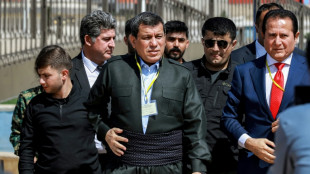
-
 Leverkusen win to delay Bayern and Kane's title party
Leverkusen win to delay Bayern and Kane's title party
-
Buenos Aires farewells native pontiff with tears and calls to action
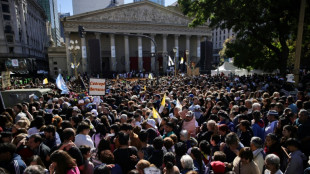
-
 Turkey's opposition says Erdogan's canal plan behind latest arrests
Turkey's opposition says Erdogan's canal plan behind latest arrests
-
Maresca hails 'nasty' Chelsea as top five bid stays alive

-
 Trump raises Putin doubts after Zelensky talks at pope's funeral
Trump raises Putin doubts after Zelensky talks at pope's funeral
-
Major blast at Iran port kills 4, injures hundreds

-
 Napoleon's sword to be sold at auction in Paris
Napoleon's sword to be sold at auction in Paris
-
Iran, US discuss nuclear deal in third round of talks

-
 Buenos Aires farewells native pontiff with call to action
Buenos Aires farewells native pontiff with call to action
-
Warholm sets hurdles world record at Diamond League, Holloway shocked

-
 US students 'race' sperm in reproductive health stunt
US students 'race' sperm in reproductive health stunt
-
Wikileaks founder Assange joins crowds for pope funeral

-
 Leader Marc Marquez claims Spanish MotoGP sprint victory
Leader Marc Marquez claims Spanish MotoGP sprint victory
-
Celtic win fourth successive Scottish Premiership title

-
 Jackson ends drought as Chelsea boost top five push
Jackson ends drought as Chelsea boost top five push
-
Warholm sets 300m hurdles world record in Diamond League opener

-
 Major blast at south Iran port kills 4, injures hundreds
Major blast at south Iran port kills 4, injures hundreds
-
Russia says retook Kursk from Ukraine with North Korean help

-
 Francis laid to rest as 400,000 mourn pope 'with an open heart'
Francis laid to rest as 400,000 mourn pope 'with an open heart'
-
Trump, Zelensky meet on sidelines of pope's funeral

-
 'Shared loss': Filipino Catholics bid Pope Francis farewell
'Shared loss': Filipino Catholics bid Pope Francis farewell
-
Families unable to reunite as India-Pakistan border slams shut
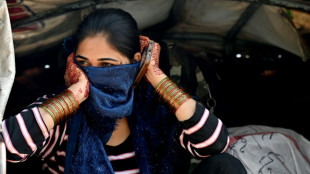

'Human-induced' climate change behind deadly Sahel heatwave: study
The deadly heatwave that hit Africa's Sahel region in early April would not have occurred without human-induced climate change, according to a study by the World Weather Attribution (WWA) group published Thursday.
The West African nations of Mali and Burkina Faso experienced an exceptional heatwave from April 1 until April 5, with soaring temperatures above 45 degrees Celsius (113 degrees Fahrenheit) triggering many deaths.
Observations and climate models used by researchers at the WWA showed that "heatwaves with the magnitude observed in March and April 2024 in the region would have been impossible to occur without the global warming of 1.2C to date", which scientists attribute to human-induced climate change.
While periods of high temperatures are common in the Sahel at this time of year, the report said that the April heatwave would have been 1.4C cooler "if humans had not warmed the planet by burning fossil fuels".
It added that the five days of extreme heat was a once-in-a-200-year event, but that "these trends will continue with future warming".
The length and severity of the extreme heat led to an increase in the number of deaths and hospitalisations in the two countries, despite their populations being acclimatised to high temperatures, the WWA said.
- Deaths in heatwave -
A lack of data in the affected countries made it impossible to know the exact number of deaths, the WWA said, adding there were likely hundreds, if not thousands, of other heat-related casualties.
"From April 1 to 4, we saw an increase in the use of services," Djibo Mahamane Diango, head of anaesthesia at Gabriel Toure hospital in the capital Bamako, told reporters on April 5.
He said the hospital had seen the arrival of 102 bodies -- more than half of them people aged over 60 -- during the first four days of this month.
That compares with 130 for the whole of the month of April the previous year, he added.
The April heatwave in Mali -- where the temperature spiked at 48.5 degrees Celsius -- and neighbouring Burkina Faso coincided with the holy month of Ramadan when Muslims fast from dawn until dusk.
It also came during power outages which restricted the use of fans and air conditioning and affected health services.
The national blood transfusion centre in Bamako had called on medical centres to suspend any non-essential transfusions because of daily power shutdowns lasting more than 12 hours a day.
Mali often suffers from electricity cuts partly due to the state of disrepair of its power stations.
Countries in the Sahel region have had to contend with drought since the 1970s, as well as periods of intense rainfall from the 1990s.
The dwindling availability of water and pasture, compounded by the development of agricultural land, has disrupted the lives of pastoral populations and encouraged the emergence of armed groups that have extended their hold over vast swathes of territory in Mali, Burkina Faso and Niger.
S.Gregor--AMWN
